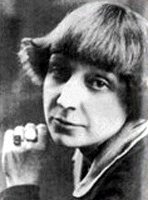Bio & Itinerary (2)
Czech (3)
Deutschland (5)
Hungary (2)
Polska (12)
Post-Trip (1)
Pre-Trip (2)
Russia (10)
The Poets (4)
Travel Tips (1)
* Wien Wieder Sehen (Definitely!)
* Wunderschones Wien!
* Voyage on the Blue Danube (In Pictures)
* Better in Budapest
* Bronchitis in Budapest
* 287 Steps!!
* In Search of Seifert
* Countryside Train, Czech-In!
* Szymborska, Sight-free Day
* Krakow Check-In
* Warsawa, Marie Curie, English Teachers
* Da svidanya!
* 'Snow', Uma, Pushkin & General St. Pete's Nostalgia
* Thelma's Tour Guide
* Peter's Palaces, Fountains, Boats
* Dostoyevsky, Rooftops, Trams, Springer News
* Hermitage
* Rain, Sunsets, Ballet, Neva, Music, Music, Music!
* Anna, Vodka, Lilacs & Elf Shoes
May 02, 2004

The Poet (excerpts)
...
for the path of comets
is the path of poets: the burn without warming,
pick without cultivating. They are: an explosion, a breaking in-
and the mane of their path makes the curve of
graph cannot be foretold by the calendar.
There are superfluous people about in
this world, out of sight, who
aren't listed in any directory: and
home for them is a rubbish heap.
They are hollow, jostled creatures:
who keep silent, dumb as dung, they are
nails catching in your silken hem
dirt imagined under your wheels.
...
We are poets, which has the sound of outcast.
Nevertheless, we step out from our shores.
...
Now what shall I do here, blind and fatherless?
Everyone else can see and has a father.
Passion in this world has to leap anathema
as it might be over the walls of a trench
and weeping is called a cold in the head.
What shall I do, by nature and trade
a singing creature (like a wire-sunburn! Siberia!)
as I go over the bridge of my enchanted
visions, that cannot be weighed, in a
world that deals only in weights and measures?
What shall I do, singer and first-born, in a
world where the deepest black is grey
and inspiration is kept in a thermos?
with all this immensity
in a measured world?
Source: Marina Tsvetaeva Selected Poems, Elaine Feinstein, translator. Penguin Books, 1993.
Brief Biography
Marina Tsvetayeva was born in Moscow to an art history professor at Moscow University, who founded what is now called Pushkin Museum of Fine Arts. Her mother was a musician. She made her debut as a poet at the age of 18 with the collection Evening Album, a tribute to her childhood. In 1912 Tsvetaeva married Sergei Efron, they had two daughters and one son. Magic Lantern showed her technical mastery and was followed in 1913 by a selection of poems from her first collections.
Tsvetaeva's affair with the poet and opera librettist Sofiia Párnok (1885-1933) inspired her cycle of poems called 'Girlfriend'. Párnok' career stopped in the late 1920s when she was no longer allowed to publish. The poems composed between 1917 and 1921 appeared in 1957 under the title The Demesne of the Swans.
After 1917 Revolution Tsvetaeva was trapped in Moscow for five years. During the famine one of her own daughters died of starvation. In 1922 Tsvetaeva emigrated with her family to Berlin, where she rejoined her husband, and then to Prague. This was a highly productive period in her life - she published five collections of verse and a number of narrative poems, plays, and essays. In 1925 the family settled in Paris. Tsvetaeva's collection Craft was published in Berlin in 1923. In Prague in 1924 she wrote 'The Poem of the End', dealing with the parting of two lovers.
By the 1930s, Tsvetaeva's poems were no longer printed in her native country. She published her essays in such émigré publications as Volia Rossii, Chisla, Poslednie Novosti, and Sovremennye Zapiski. Sometimes her essays were printed in a brutally cut form and in 1926 her attack on the Russian émigré literary establishement made her persona non grata.
In Paris the family lived in poverty, the income came almost entirely from Tsvetaeva's writings. When her husband started to work for the Soviet security service NKVD, the Russian community of Paris turned against Tsvetaeva.
Friendless and almost destitute she returned to the Soviet Union in 1938, where her son and husband already lived. Next year her husband was executed and her daughter was sent to a labor camp. Tsvetaeva was officially ostracized and unable to publish. After the USSR was invaded by the German Army in 1941, Tsvetaeva was evacuated to the small provincial town of Elabuga with her son. In despair, she hanged herself ten days later on August 31, 1941.
Tsvetaeva left behind a great body of work, that broke new ground for women poets. In her poems Tsvetaeva used characters from the Bible, heroines of the classical mythology, and Russian folklore and history. Boris Pasternak admired her work and later wrote: "The greatest recognition and reevaluation of all awaits Tsvetaeva, the outstanding poet of the twentieth century."